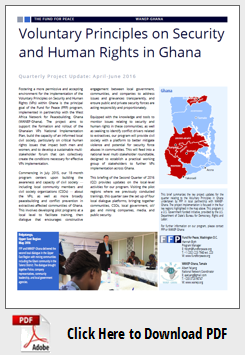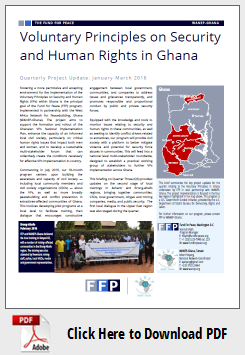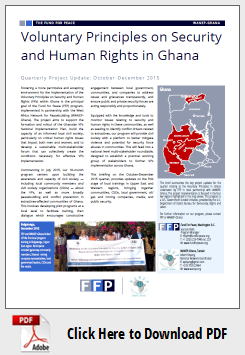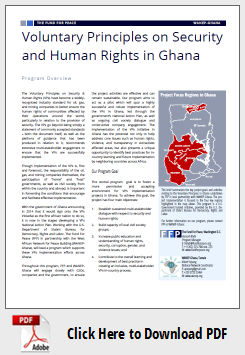 This briefing of the Second Quarter of 2016 (Q2) provides updates on the local-level activities for our program. Visiting the pilot regions where we previously conducted trainings, this quarter saw the set up of four local dialogue platforms, bringing together communities, CSOs, local government, oil/gas and mining companies, media, and public security.
This briefing of the Second Quarter of 2016 (Q2) provides updates on the local-level activities for our program. Visiting the pilot regions where we previously conducted trainings, this quarter saw the set up of four local dialogue platforms, bringing together communities, CSOs, local government, oil/gas and mining companies, media, and public security.
FFP and WANEP-Ghana delivered local dialogues to discuss VPs-related issues in mining, and oil/gas affected communities. A total of 73 participants took part across the four regions including the Minerals Commission, the Ghana Police Service, Ghana Navy, the Commission on Human Rights and Administrative Justice (CHRAJ), traditional leadership, companies, local media (Ghana News Agency), the District/Metropolitan Assembly, Ghana National Petroleum Commission, private security providers, and religious bodies.

 The first local dialogue was held on February 22 in Bolgatanga, Upper East region. The dialogue, led by WANEP-Ghana, was attended by stakeholders including the Ghana Police Service, the Commission on Human Rights and Administrative Justice (CHRAJ), Traditional leadership, the Shanxii Mining Company, small scale mining groups, the Talensi and Nabdam District Assemblies, the local media (Ghana News Agency) and the Lands Commission.
The first local dialogue was held on February 22 in Bolgatanga, Upper East region. The dialogue, led by WANEP-Ghana, was attended by stakeholders including the Ghana Police Service, the Commission on Human Rights and Administrative Justice (CHRAJ), Traditional leadership, the Shanxii Mining Company, small scale mining groups, the Talensi and Nabdam District Assemblies, the local media (Ghana News Agency) and the Lands Commission.
